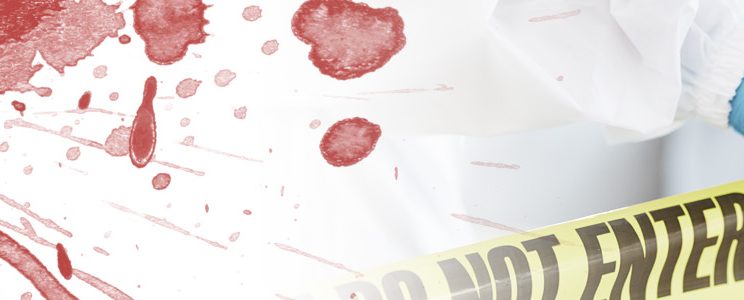Original Release Date: December 3, 2021
In this special release episode, Just Science sat down with Nicole Jones, the Director of the Forensic Science Translation and Implementation Program in the Center for Forensic Sciences at RTI International, and John Grassel, a Program Manager in RTI’s Center for Forensic Sciences and co-Director of the Forensic Technology Center of Excellence, or FTCOE, to discuss toolmark analysis and advanced capabilities in firearms.
The FTCOE supports the implementation of innovative technologies that address the challenges faced by the forensic science community. 3-D imaging technology for firearm and toolmark examination is an example of an emerging technology the FTCOE evaluates. Listen along as these expert forensic scientists discuss the work the FTCOE performs to address firearm violence, how evidence is collected from a firearm, and the FTCOE’s upcoming Firearm and Toolmarks Policy and Practice Forum on January 11-14, 2022 in this episode of Just Science.
This episode of Just Science is funded in part by the National Institute of Justice’s Forensic Technology Center of Excellence and RTI International’s Applied Justice Research Division.
View or download the episode transcript here:
Transcript
Guest Biography
Nicole Jones is the Director of the Forensic Science Translation and Implementation Program in the Center for Forensic Sciences (CFS) Applied Justice Research Division at RTI International. In this role, Ms. Jones leads projects to implement evidence-based practices and methodologies to advance the reliability, reproducibility, and accuracy in the application of forensic science. She has more than 20 years of experience in chemical analysis, quality systems management, and quality assurance (QA), including 10 years of experience working with the National Laboratory Certification Program (NLCP) and Inspector for periodic compliance inspections. She has been responsible for evaluating CFS–supported U.S. Department of Justice (DOJ) grant activities, including technology evaluation, technology assistance, and technology transfer. In this role, she has served as a liaison between state, local, and federal law enforcement; the National Institute of Justice (NIJ); and the research community. She has also served as the Task Leader and liaison for multiple DOJ working groups including the NIJ Forensic Science Technology Working Group, the Forensic Laboratory Needs Technical Working Group (FLN-TWG) and the FBI’s Technology Working Group for Three Dimensional Toolmark Technologies (TWG-3D2T). She has developed validation protocols for implementing new instrumentation and new technologies for use in forensic drug testing laboratories. She has over 15 years’ experience develop best practices and guidance to strengthen medicolegal death investigation and has worked closely with the Center for Disease Control (CDC) to update the recommendations for investigating, diagnosing and certifying cause and manner of death and producing training on those recommendations. Before joining RTI, Ms. Jones served as the Lead Auditor and Quality Assurance Officer at General Engineering Laboratories (GEL) in Charleston, SC, a multi-site ISO accredited laboratory and as the Quality Manager of the Environmental Laboratory at Harbor Branch Oceanographic Institute (HBOI). While at GEL, she worked on the Laboratory Information Management System (LIMS) implementation team and was responsible for the ISO accreditation initiative. She also worked closely with the Naval Weapons Station to develop methods for explosive detection using liquid chromatography with tandem mass spectrometry detection (LC-MS/MS) and conducted training for inspectors to assist them in identification of fraudulent laboratory practices. Ms. Jones is currently the Quality Assurance Project Manager for the National Missing and Unidentified Persons (NamUs) program, a national clearinghouse funded by NIJ, which offers critical investigation support and free forensic services to facilitate the resolution of missing and unidentified person cases nationwide. View RTI Profile.
John Grassel holds a Master of Science in Biomedical Forensic Science from the Boston University School of Medicine and is a Forensic Science Program Manager at RTI International. In this role, he leads cutting-edge, technology-driven efforts to support basic and applied research serving the criminal justice and forensic science communities. Mr. Grassel currently serves as a scientific lead of NIJ’s FTCOE, which supports the forensic science and criminal justice communities with transitioning research into practice. Mr. Grassel is certified by the International Association for Identification (IAI) as both a Certified Footwear Examiner (CFWE) and Certified Senior Crime Scene Analyst (CSCSA) as well as a Certified Forensic Mapping Specialist and Public Safety Laser Scan Technician. Mr. Grassel is a Past President of the New England Division of the IAI, the current Vice President of IAI and serves as the IAI chair on the ISO-US TAG. In addition, Mr. Grassel serves as the Chairman of the International Association of Chiefs of Police (IACP) Forensic Science Committee and on the FBI Rapid DNA Task Force Working Group and the OSAC Footwear and Tire Subcommittee. Prior to joining RTI, Detective Lieutenant Grassel served as the officer in charge of the Rhode Island State Police, Forensic Services Unit.
The opinions, findings, and conclusions or recommendations expressed in this podcast episode are those of the presenter(s) and do not necessarily reflect those of the U.S. Department of Justice.
Contact us at ForensicCOE@rti.org with any questions and subscribe to our newsletter for notifications.




